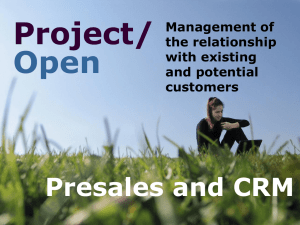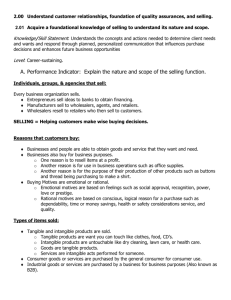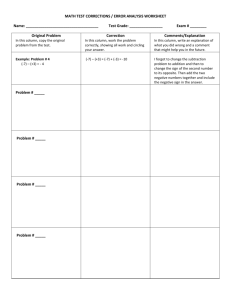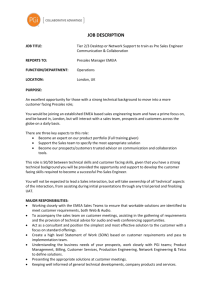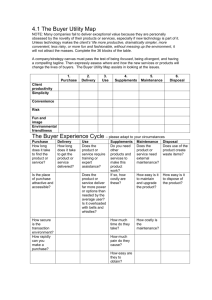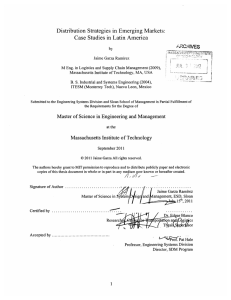2.01B - Explain the role of customer service as a component of
advertisement
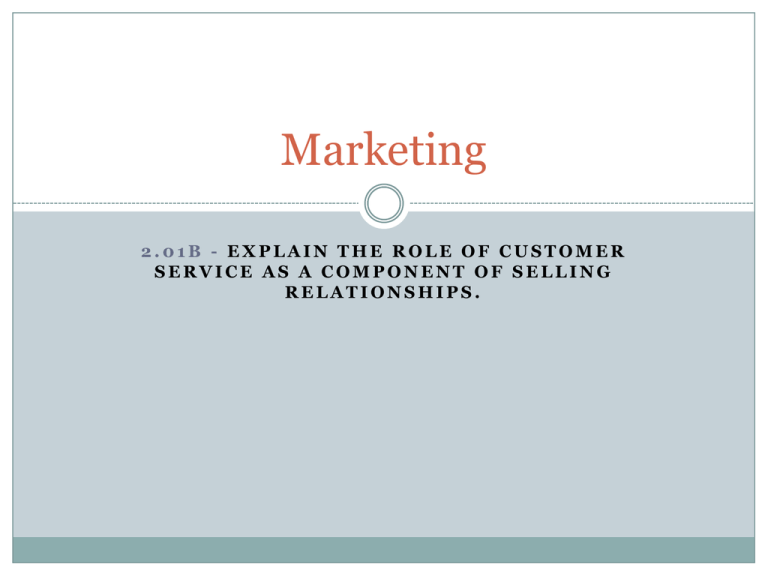
Marketing 2.01B - EXPLAIN THE ROLE OF CUSTOMER SERVICE AS A COMPONENT OF SELLING RELATIONSHIPS. Customer Service DISTINGUISH BETWEEN PROCESS OR FUNCTION Customer Service Process Flow Provides the overall structure providing a consistent set of processes to record and track user contact. When a customer contacts the business’s Service Desk, the Customer Service Representative (CSR): Records the user’s contact information and the details of the request. Classifies the user’s request. Determines the supportability of the request. Resolves the user’s request. Confirms the resolution and closes the request. Ensures good service Customer Service as a function A department or function of an organization that responds to inquiries or complaints from customers of that organization. Customers may communicate in person or via written correspondence, & toll telephone. Customer service as a process Requires step by step instructions to follow a specific system. Customer service as a function is broader than a process. It is a governing philosophy that oversees the business as a whole. Customer service to beat competition There’s no real secret to keeping your customers or getting your customers to come back. All you need to do is provide customer service that exceeds your customers' expectations and outshines your competitors' customer service. 1) Determine what makes what you offer special. Study the competition. Think about their customer service and the customer service you provide. can you offer your customer that is “better” than the competition? There are sure to be aspects of your customer Service that you can promote as “Special”. 2) Study the customer service ideas on your list and examine their feasibility. Can you really guarantee that you will always stick to your written estimate or provide a faster turnaround time than your competitors? If you aren’t sure, or can’t do it, cross it off your customer service ideas list. 3) Choose one or two of your shiny customer service ideas and implement them. This doesn’t just mean do it; you also need to let people know that you’re doing it. Feature this aspect of your customer service in whatever ads you run, including your yellow pages listing. Put it on your business cards and in your email signature. Make it part of your greeting spiel when you answer the phone. 4) Stay proactive and keep gathering customer service ideas. Neither Sears nor Sleep Country Canada have achieved their success by doing the same thing for the last thirty years, or by simply reacting to customer complaints. Listen to your customers and find out what kind of special customer service they want. You can do this formally, by creating a customer satisfaction feedback form that you enclose with every sale or post on your website, or informally, by asking them for their customer service ideas when they're in your store or office. Shiny customer service is service that’s responsive to customers' needs. Customers are tired of dealing with…. retailers that ignore customer service or only pretend to have it, and as always, they’re voting with their dollars. Shiny customer Service will draw customers to your product or service, rather than a competitor, and bring them back in droves. Factors that influence customer expectations When I’m a Customer, I Want… To be taken seriously To be informed of the Knowledgeable help Competent, efficient service Friendliness Anticipation of my needs To be kept informed Explanations in my terms Follow-through Basic courtesies Honesty options Feedback Not to be passed around Professional service To be listened to (and heard) Empathy Dedicated attention Respect Customer service and sales relationships It seems to be a universal, ever-present, nagging concern – how do I present myself in an authentic, effective manner that makes me feel comfortable and accomplish my sales goals all at the same time? Here’s how to create an authentic and powerful transformation. Move from your worried perception of yourself as a sales persuader targeting a victim with money, to a professional consultant whose goal is to partner with a customer to help fulfill their wants, needs and desires. Sounds better already, doesn’t it? 5 key elements of a professional, comfortable, consultative relationship Honesty and Candor Peer-Level Perception Patience to Allow a Relationship to Develop Respect Trust Honesty and Candor Communicate clearly what your product or service can and cannot provide, even in the face of losing the customer’s business. Peer-Level Perception Present yourself as a colleague; a peer who is jointly evaluating with the buyer, whether a business relationship will be mutually beneficial. Patience to Allow a Relationship to Develop Sometimes you can hit it off immediately with someone; other times it can take months for the relationship to develop. It’s ok to let time take its course. Respect Although you may not be friends, respect what the buyer’s values and intent are, and the buyer will respect your approach to business and your professionalism. Trust Hold the perspective that you will sell to the “right” buyer. Trusting that true needs will be served, if the buyer is a good fit it will keep you relaxed and enjoying the process. Pre-sales opportunities, customer service, and sales relationships Does pre-sales' and post sales' customer service mean anything to you? It should mean a lot to anybody in a business relationship. Customer service leads to customer satisfaction. Customer satisfaction determines the life and death of ANY company. Presales All the effort needed to prepare to make a sale. This includes the research and planning those sales people go through or the marketing that companies employ. The primary focus is to identify the clients’ needs so they can offer a solution. Presales is a process or a set of activities normally carried out before a customer is acquired, though sometimes presales also extends into the period the product or service is delivered to the customer. In a typical sales cycle the stages are: Contact Lead / Suspect Prospect / Opportunity More on Presales The task of a presales person starts from the initial contact phase and often ends once the customer is acquired i.e. sale is made. In some cases, presales also provide some initial or transitional support post sale. The role of presales falls right in the middle marrying the customer needs to the (provider) company's services or products. The presales professional understands what the customer needs, develops an initial view of the solution the customer needs, then tailors the product or service of his company to meet what the customer needs, explains (or helps sell) this solution to the customer, helps close the deal or sale and often stays on to ensure that the delivery team or product specialists that follow him provide the intended solution. More on Presales Company can maintain data about customers and generate mailing lists based on specific customer characteristics Marketing activities such as tracking customer contacts, including sales calls, visits, and mailings Customers can get pricing information about the company’s products Through an inquiry or a price quotation Salespeople study their products, keep abreast of industry trends and competitors, research potential customers, and develop familiarity with their company’s policies and procedures. Self-evaluation by reviewing actions through the sales process and identifying actions that results well and results poorly Review ethical and legal issues surrounding the selling situation Post-sales opportunities, customer service, and sales relationships Post sales is the effort that companies and sales people go through after the sale to ensure that the customer is happy and build future business. Support Post-sale activities The performance outcomes, skills and knowledge required to attend to post sale activities that build and strengthen the partnership between a salesperson and the client, and enhance the prospect of future sales. Process Order Deliver Support to Agreed expectations Handle client feedback Strengthen client relationships Offer additional benefits to Clients Process order Record client order details in accordance with organizational policies and procedures Forward order for product to the relevant section of the organization Monitor the processing of the order Deliver support to agreed expectations Provide technical assistance and/or advice in relation to the product purchased Handle defective returns in accordance with organizational requirements Provide information to facilitate product repair, support or servicing Provide liaison services to assist clients to access appropriate after-sales support Handle client feedback Clarify and confirm feedback with clients Determine client's needs and requirements Identify and evaluate possible responses to client feedback Respond to client needs and requirements in accordance with organizational policies and procedures Make contact with client to ensure the response is satisfactory Strengthen client relationships Ensure contact is made with the buyer post-sale to ensure agreed expectations have been met Use feedback solicitation methods on the sales process and product satisfaction Identify, address and resolve service problems and difficulties identified through feedback Offer additional benefits to clients Develop and implement client loyalty strategies to secure buyer loyalty and to facilitate ongoing contact Contact buyer regularly post-sale at an appropriate level to maintain relationship and to identify new sales and cross-selling opportunities Offer additional sales solutions and benefits to clients when opportunities arise Salespersons maximizing from the customer service activities Four phases of the cultivation of customer relationship: Prospecting Acquiring Servicing Retaining 9 Sales Activities to Take This Week To Improve Your Results Call and Thank Your Largest Client Maybe your largest client gets plenty of attention. Maybe they demand plenty of attention. Call three contacts at your largest client this week to thank them for their trust. Call a Client to Schedule and Unscheduled Review Formal, scheduled reviews are a wonderful way to work with your clients to continuously improve. But there is no reason to wait for the calendar to change to sit down with your clients, even if a review is imminent. Call one client and schedule an unscheduled review. Find out what you can do to improve your service between now and the next scheduled review. Review and Analyze Your Wallet Share Make a spreadsheet with four columns. In column one, make a list of your clients by name. In your second column, make a list of how much they have spent with you this year. In the third column, add the amount you believe they spend in your category. In the fourth column, divide column two (the amount they have spent with you) by column three (the amount you believe they spend). The result in column for is your wallet share. Just stare at the list and let the numbers sink in for a while . . . when the pain is too much to bear, move on to number 4. Steps 4-9 Schedule to Review Your Performance with Low Wallet Share Clients Schedule appointments with your highest value, lowest wallet share clients. Visit them with the sole objective to listening to them talk about you, your business, and your performance. Find out what makes you hard to do business with so that you can make the necessary adjustments and sell the changes inside. Schedule an Unscheduled Visit with You Sales Manager (Or Sales Person) to Strategize on Dream Clients and/or Wallet Share You don’t have to wait until you have a scheduled meeting to work with your team on improving your performance. Schedule a meeting with your sales manager to discuss ways in which you might move some of your dream clients into the pipeline. If you are a sales manager (or a Vice President of Sales), schedule to meet with a salesperson to brainstorm how you might help them move a dream client. Also, this is the perfect time to talk about your Wallet Share report. Steps 6-7 Take Two Non-Sales Members of Your Team to Lunch To succeed in sales (or anything else), you need to build relationships. The relationships on the inside of your company are every bit as critical to your success as the relationships you develop outside your company. Identify two members of your team with whom you need to develop a closer, more effective relationship and take them to lunch (yes, you have to pay for their lunch . . . we are courting them like we would a client!). Write a Public Letter (Or Email) of Appreciation for Your Non-Sales (but Still Essential) Team Members We win deals. But that endeavor, no matter how it might seem, is the result of the work of your whole team. Don’t believe me? You know those letters of reference you carry around in your binder? You don’t really think those are about you alone, do you? You received the credit for the win. You received the public accolades. You are receiving the commission. You aren’t doing all of the work. Write a very public email thanking your team for their work on a single account. Choose the account for which you will publicly praise their work based upon how much it stretched the whole team. Let them know that their work means the world to you and your client . . . it does! (Less than two paragraphs isn’t thoughtful enough and more than three means they will know someone put you up to it) Steps 8-9 Make Your Pipeline a Work of Fact—Not Fiction Your pipeline is full of client names that aren’t in any way, shape, or form real opportunities that you should be pursuing. Review your pipeline with a fine-tooth comb. Remove any opportunities that are no longer opportunities—and remove the entries that never were really opportunities. It is likely that you will have a much narrower list of opportunities, but that the opportunities you have left will be ones that you have a possibility of winning. If you want a bigger list of opportunities, you must prospect. Make a List of Dream Clients (And Call Them) This is old advice for readers of this humble blog. But it is still rock solid. Dream clients are the prospects for who you can do breathe taking, aweinspiring, results-transforming work. If you have not made this list, do it now! Make a list of the prospects that fit the above description. Then make a list of reasons you believe you can do drop dead, magnificent, game-changing work for them. Then call them and share what you have been thinking about. Nurture these relationships! Conclusion Your sales manager doesn’t measure all of the activities that you must take in order to succeed in sales. Some of the most important performanceimproving activities aren’t measured at all. Complete these nine activities this week; they won’t show up on your reports, but they will show up in your results
